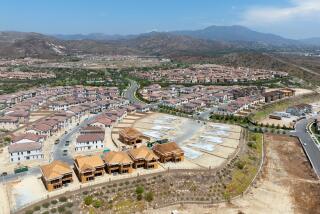Residents of Golfview, Fla., Put Their Town Up for Sale to Escape Noise and Congestion
- Share via
GOLFVIEW, Fla. — When they decided that their corner of Palm Beach County was getting too crowded and noisy, the people of this town did not write their congressman, picket the state Capitol or form a no-growth movement.
They put the place up for sale.
The whole place: the 75 houses, the streets and sidewalks, the town hall--steeple and all.
“Rather than get angry, people here said, ‘We’ll just zone commercial and sell out,’ ” said Town Manager Pinky Yount.
This form of civic suicide is still unusual. But when rapid suburban commercial development increases property values and decreases the quality of residential life, it is not irrational.
Homeowners in dozens of communities in the South and Southwest have banded together to rezone their land and sell it as one parcel to a developer, who can then tear down the homes and erect apartment houses, stores or office buildings.
Greater Atlanta is the neighborhood-buyout capital, with more than 40 proposed or completed. The largest occurred in the Lake Hearn area, where a developer bought a parcel that included 140 homes, which he promptly razed. The deal went through only after the residents won a court battle with county officials who had refused to rezone their subdivision.
But in Golfview’s case, marvels Anthony Catanese, a University of Florida professor who has studied neighborhood buyouts, “An actual government has said, ‘We’re for sale.’ That’s extraordinary.”
So was Golfview’s situation. Founded in the 1930s on part of a golf course, Golfview was a rural area until an adjacent strip of asphalt called Morrison Field became Morrison Air Force Base, which in turn became Palm Beach International Airport.
Today, Golfview finds itself encircled by noisy runways and increasingly congested highways. There is no golf and no view, other than the underside of Boeing 737s.
The idea of a buyout came up four years ago at a neighborhood cocktail party. Al Cone, a lawyer who had spent $10,000 soundproofing his house, remarked that Golfview’s location had lowered its residential value, but increased its commercial value.
After months of discussion, homeowners signed an agreement to sell their 64 acres en masse to a developer, and the town council promised to rezone the property. A real-estate firm was retained to market the town, and sales brochures were printed to advertise a “strategic location at the northwest corner” of the airport.
The homeowners are asking $35 million, which would pay them at least two times the residential market value of their houses, which ranges from $150,000 to $300,000. The proceeds will be divided up through a complicated formula designed to reflect both the condition of the houses and lot size.
Where will everyone go? “People here like their freedom and privacy,” said Yount, the town manager. “They’ll probably go further west to other developments,” with the city following steadily behind.
There is, however, one holdout: the elderly, nearly blind Neva Brockway, who arrived in the 1930s, reared a family here, and said, “I always thought I’d finish my life out here.”
She seems resigned to moving, but her family has not signed the agreement. Cone said they just don’t want to worry her, and they are expected to cooperate when a sale date nears.
In Florida, a state that gains about 900 new residents a day, Golfview also offers a reminder that nothing lasts forever.
“I like where I live,” Cone said, “but everything in life is for sale, except your honor and your health.”
More to Read
Sign up for Essential California
The most important California stories and recommendations in your inbox every morning.
You may occasionally receive promotional content from the Los Angeles Times.













